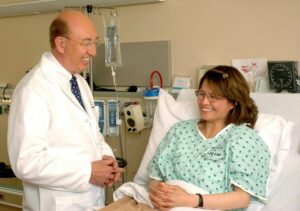
Case Study: Celerion Provides Continuous Blood Pressure Monitoring for Pharma Client
Background
Contract Research Organizations (CROs) like Celerion conduct drug research studies on behalf of pharmaceutical companies, using cohorts of healthy subjects, who are paid for their participation. A study can last for anything from one day to two months, sometimes longer, and during the trial, subjects’ vital signs are monitored.
This can involve collections of blood, urine or stools and in some trials, subjects will be kept bed-bound throughout. These types of studies are difficult to conduct and are often demanding on the subjects. The more comfortable the subject experience, the lower the withdrawal rate is going to be, so CROs are always on the lookout for ways to make their trials more comfortable for their subjects.
In 2019 and 2020, Celerion was contracted to conduct two studies to investigate a novel bi-dose nasal delivery drug/device combination that would be used to treat severe allergies, such as anaphylaxis at its center in Lincoln, Nebraska. The drug would be dosed nasally, using a novel bi-dose nasal spray device, with subjects in bed, with multiple vital sign checks, including blood pressure, heart rate, at very frequent intervals taken using a traditional Welch Allyn pole-mounted device. Celerion was looking for a better way to monitor vital signs more quickly and conveniently to identify changes continuously in real-time, and approached Caretake Medical to ask how readily we could produce the data they needed for this study.
Our wireless Caretaker 4 wearable vital signs monitor provided the solution. With beat-by-beat BP data sent via Bluetooth from all the subjects to the monitoring console, it provided the continuous blood pressure monitoring; real-time data that were required.
Moreover, the comfort and convenience of this lightweight, wearable device meant was more comfortable and less intrusive to the subjects with reduced effort required to collect these data by the research staff. We supplied 18 Caretaker 4 devices for the trial, which spanned several months and multiple subject cohorts.
Outcome
Celerion is continuing its study of the drug, using the Caretaker 4 not just for BP monitoring but for all the vital signs. So far 3 studies have been completed for 133 subjects, with 2 more studies planned in 2021 and 120 additional subjects to be enrolled. Celerion’s client, Bryn Pharma LLC has reported their data generated in their first studies in 2020 and the data from the third study will be presented at the American Academy of Asthma, Allergy, and Immunology (AAAAI) Feb 26 – Mar 1.
As a result of this trial, Celerion recommended Caretaker for other clients as the preferred technology for other trials, including an advanced hemodynamics use case with Caretaker’s cardiac output and stroke volume as an exploratory endpoint for an investigational new drug trial. “We found that using Caretaker for continuous blood pressure monitoring and vital signs made it faster and more efficient for our staff, and more comfortable for the patients, and generally the dosing days went more smoothly compared to using traditional monitoring methods” said Kelly Pachunka, Sr. Manager, Clinical Operations at Celerion.
Insight
CROs and their Pharma clients always look to safely and efficiently bring therapeutics to market while maximizing patient comfort. Caretaker allows both. At Hospital Phase 2 trial sites where staffing and research funding is limited, Caretaker can provide a further advantage.
In certain competitive enrollment trials where total subject numbers are limited, CROs and research hospitals compete for research dollars and are rewarded for the number of subjects they enroll. Caretaker 4 gives them a competitive advantage because it can monitor faster and continuously, is comfortable and so does not cause subjects to drop out, and can also be used to monitor subjects from home.
This remote functionality has enabled research centers to restart trials that had been halted by Covid-19. For example, Yale has been able to recommence a study of Alzheimer’s patients, no longer requiring them to come in for trials but monitoring them from home using the Caretaker 4.
About Celerion
Celerion, a global leader in early clinical research services, “Translates Science into Medicine” with its powerful combination of scientific excellence, medical expertise, and clinical operations experience to give clients the confidence to make fast, accurate decisions about their drug development path during the crucial early development period. For 50 years, Celerion has provided industry leadership and execution of safety/tolerability, pharmacokinetic, and pharmacodynamics studies in highly controlled clinical environments such as firstin-human dose escalation, drug-drug interaction, cardiac safety, bioequivalence and bioavailability, metabolism and excretion program, as well as pharmacokinetic evaluations in patients with impaired renal or hepatic function. Celerion completes the offering with data management, biostatistics, clinical monitoring, and bioanalytical services. Our founding mission is to help our clients get their drugs to market quickly so that they touch the lives of our families, friends, and people in need around the world. For more information, please visit www.celerion.com.
About Bryn Pharm LLC.
Bryn Pharma, founded in 2016, is a privately held pharmaceutical company founded by patients for patients. Bryn is focused on positively disrupting the existing market for epinephrine auto-injectors by delivering an accessible, easy-to-use alternative that better meets the needs of patients. Bryn Pharma seeks to provide this growing population at risk for anaphylaxis with A Better Way to be prepared for a life-threatening allergic reaction. For more information visit www.brynpharma.com.
For a safer tomorrow, contact Caretaker Medical today!
Caretaker Medical is a Wireless Digital Health company that has developed a continuous Blood Pressure monitoring and vital signs that eliminates blind spots between traditional intermittent spot-check monitors and untethers patients from mobility-restricting wires and hoses. The FDA-Cleared Caretaker4 wireless monitor utilizes a simple finger cuff and patented Pulse Decomposition Analysis technology to measure uninterrupted blood pressure, hemodynamics, and other parameters for wire-free, “touchless” remote patient monitoring that maximizes patient comfort and clinical decision-making. For more information, please visit www.CaretakerMedical.net.
More medical news and events

Virginia Catalyst Awards Caretaker Medical with Grant to Advance VitalStream Development for Improved Patient Outcomes
The Virginia Catalyst, also known as the Virginia Biosciences Health Research Corporation (VBHRC), has awarded $3.18 million in grants to four life and bioscience projects…

Intraoperative Hypotension: A Public Safety Announcement for Anesthesia Professionals
This article from the Anesthesia Patient Safety Foundation Newsletter discusses the modifiable risk of intraoperative hypotension (IOH) and its far-reaching consequences for patients and healthcare…

Using VitalStream for cardiac surgery with Zain Khalpey, MD
We sat down with Zain Khalpey, M.D. Cardiothoracic Surgeon, Director of Artificial Heart, MCS & ECMO, and Chief Medical AI Officer (Network Director) at Honor…
